Key takeaways:
- Understanding the software development lifecycle is crucial for streamlining workflows and embracing agile methodologies for efficiency.
- Hands-on experience enhances problem-solving skills and provides a deeper understanding of software development beyond theoretical knowledge.
- Effective communication and adaptability are key skills in software projects, helping to clarify expectations and embrace constructive feedback.
- Time management, team dynamics, and thorough testing are vital lessons learned from initial projects to ensure successful outcomes.
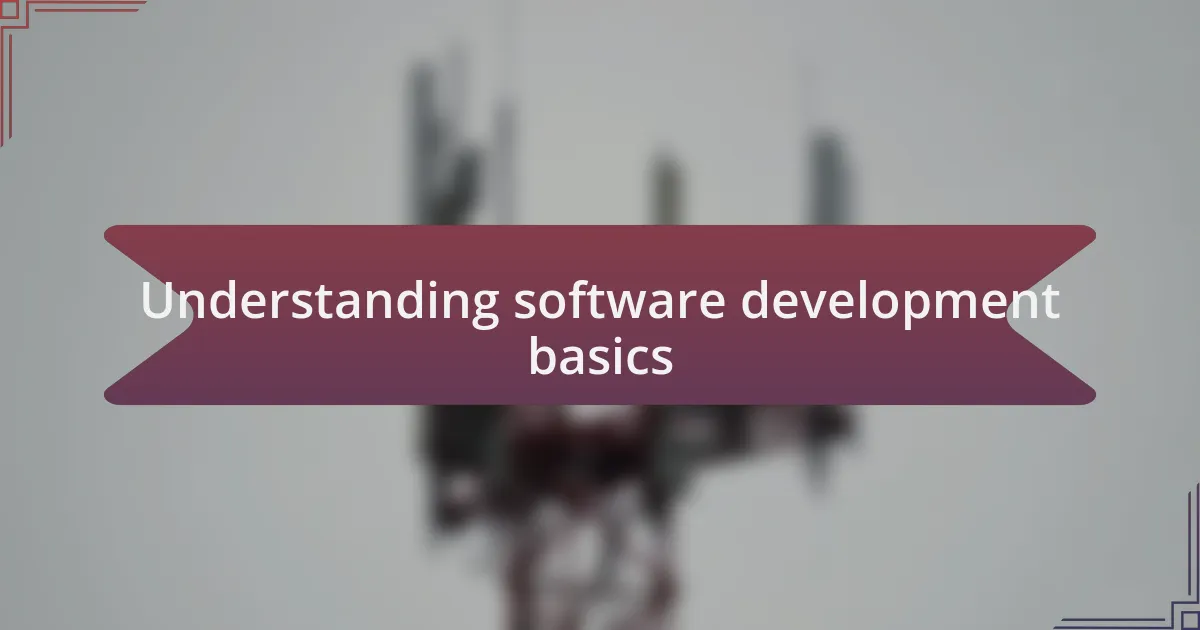
Understanding software development basics
Diving into software development basics can feel overwhelming at first, but it’s like learning a new language. I vividly remember the moment I first grasped the concept of algorithms; it was as if a light bulb went on. I still reflect on how those simple if-else statements laid the groundwork for the more complex logic I’d eventually encounter.
Seeing how programming languages empower developers to create solutions is truly fascinating. I recall writing my first lines of code and the thrill that came with transforming an abstract idea into a functional program. Have you ever experienced that rush of solving a challenging bug? It’s in those moments that you realize the importance of problem-solving in software development.
Understanding the software development lifecycle brings clarity to the process. Each phase, from planning to deployment, felt like a journey I was on, filled with learning and growth. I found myself asking, “How can I improve my workflow?” Embracing agile methodologies helped me streamline my approach, making the process not only more efficient but also enjoyable.
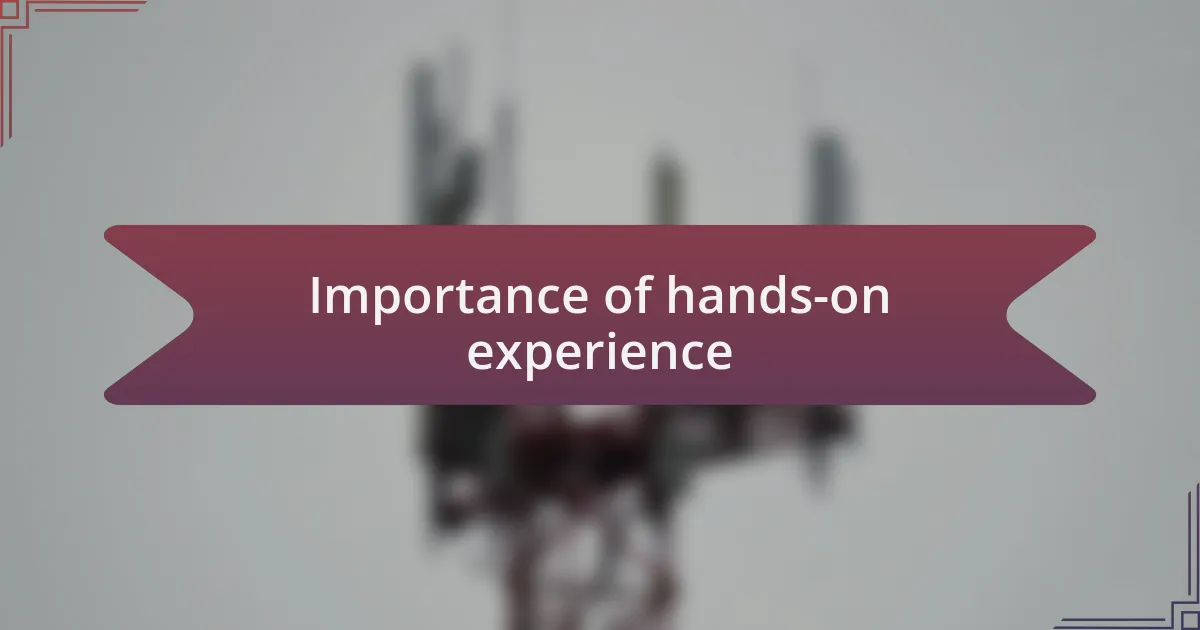
Importance of hands-on experience
Gaining hands-on experience in software development is like receiving a key that unlocks a world of understanding. I remember my first hands-on project; it wasn’t just about coding, but about grappling with real-world problems and discovering solutions. Have you ever felt the pressure of a deadline while debugging? That moment pushed me beyond theory—it made me a developer.
Engaging directly with projects equips you with skills that books or tutorials alone cannot provide. I once spent hours tracing through lines of code and, during that frustrating process, I learned the significance of patience and perseverance. It was less about immediate success and more about the journey of growth that truly shaped my abilities.
The confidence I gained from my first project was transformative. Suddenly, concepts I used to find abstract became tangible and relatable. I often think back to that experience and ask myself, how would I approach challenges now? That hands-on experience didn’t just teach me technical skills; it instilled a deeper understanding and passion for the craft.
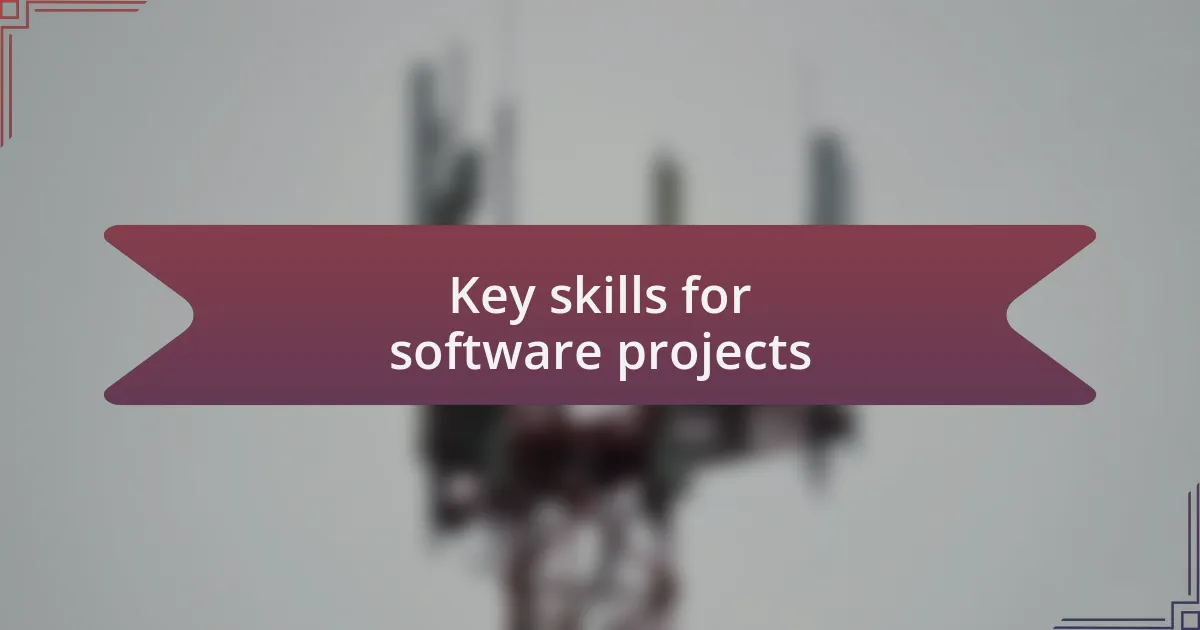
Key skills for software projects
When working on software projects, communication is crucial. I vividly recall a time in my first project when miscommunications led to wasted hours. We were implementing a feature, and assumptions flew around like confetti. I learned that taking a moment to clarify expectations saved so much time, teaching me the importance of being clear and open with my team.
Another key skill is adaptability. In my early days, I developed a feature that seemed perfect until it hit user testing. I remember feeling my heart sink when feedback suggested a complete overhaul. Embracing that feedback—not resisting it—was a turning point. It taught me that flexibility can lead to better outcomes and often enhances the end product.
Lastly, I can’t emphasize enough the value of problem-solving. I encountered a bug that seemed insurmountable at first; I almost threw my hands up in defeat. But then I remembered a mentor’s advice: tackle problems systematically. By breaking it down, I found a solution, and that feeling of triumph was unforgettable. It reinforced my belief that challenges are just opportunities in disguise.
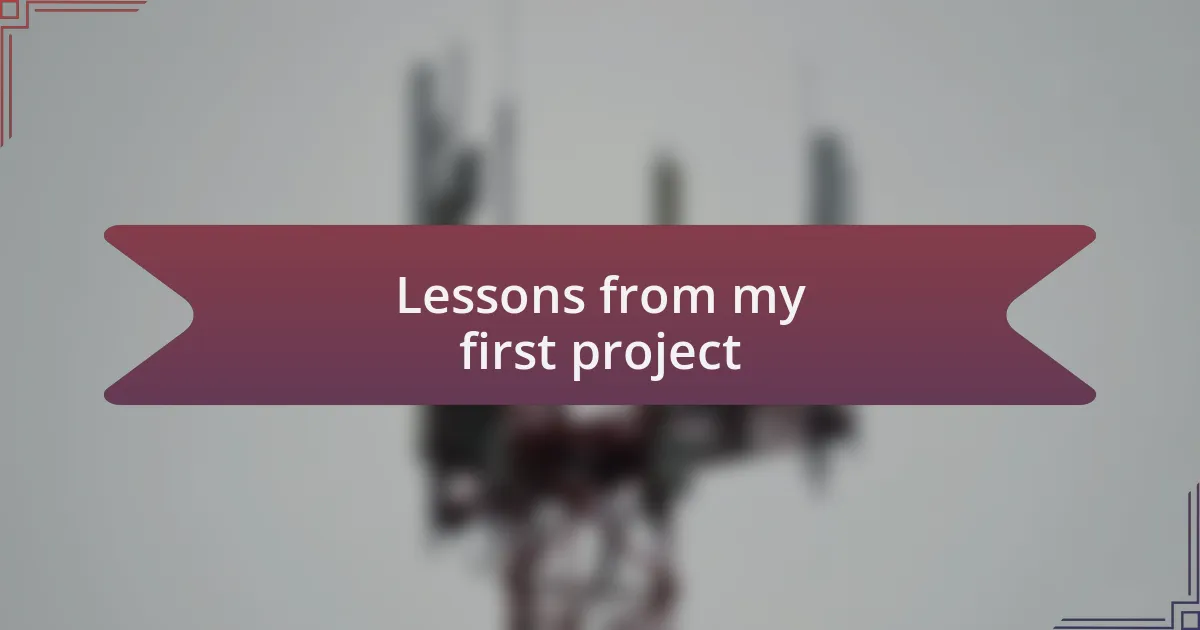
Lessons from my first project
When I think back to my first project, one of the most important lessons was the necessity of time management. There were days when I felt overwhelmed, juggling tasks and deadlines. I vividly remember a week where I missed key deadlines because I underestimated the time needed for each task. This experience taught me the value of pacing myself and realistically assessing how long things truly take—it’s a skill that has proven invaluable in my subsequent projects.
Another striking lesson was the significance of team dynamics. Working with different personalities was eye-opening. I fondly recall a brainstorming session where a quiet team member finally shared an idea that completely changed the project’s direction. That moment drove home to me how vital it is to create an inclusive environment where everyone feels comfortable contributing. Isn’t it fascinating how a single voice can shift the course of a project?
Finally, I learned the impact of thorough testing. In my first project, we glossed over this step, thinking we had everything covered. When the initial version was unveiled, it quickly became clear that we had missed critical issues. The resulting scramble to fix them taught me that diligence in testing not only saves time but also builds trust with users. How often have you wished you’d given something a good look before going public? In software development, it’s an essential mantra.
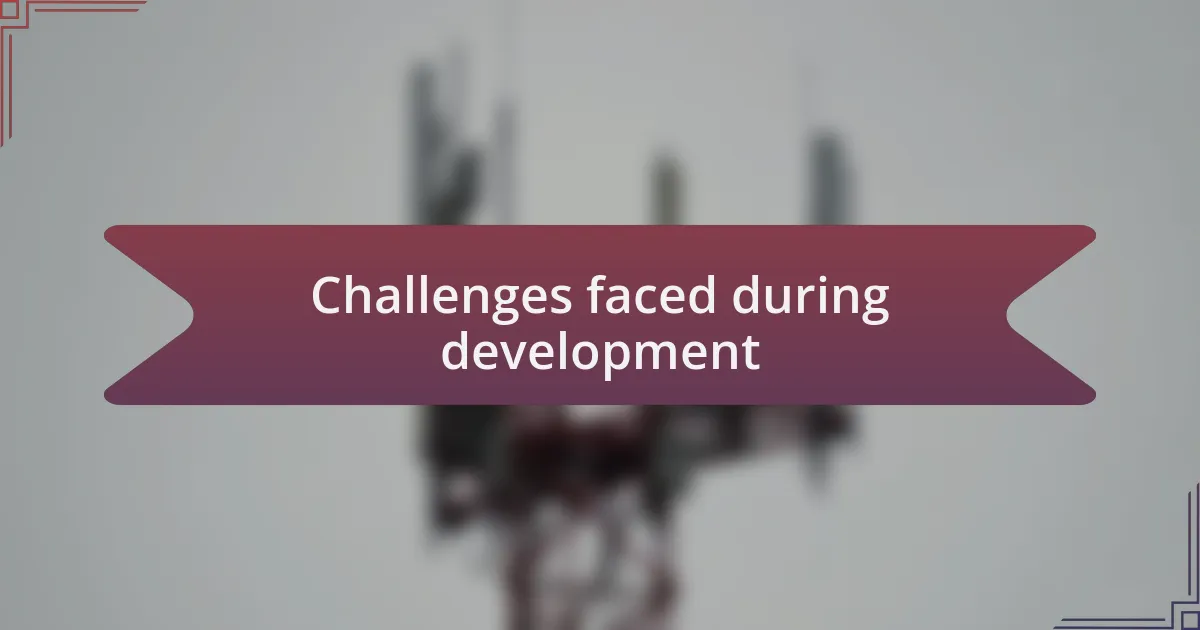
Challenges faced during development
One of the biggest challenges I faced during the development of my first project was dealing with unexpected bugs. I remember spending hours perfectly coding a feature, only to find that it caused a cascade of errors elsewhere. Each time I thought I had resolved an issue, another would pop up like a game of whack-a-mole. It was both frustrating and enlightening, reminding me that debugging can often take more time than the initial coding itself. Have you ever felt like you were running in circles trying to fix something that just wouldn’t cooperate?
Communication barriers presented another significant hurdle. In a team setting, I quickly realized that not everyone interprets technical jargon in the same way. I can’t count the number of times I thought I explained a concept clearly, only to find confused expressions on my teammates’ faces during our meetings. It became clear that adjusting my communication style was essential for collaboration. After all, how can a team succeed if everyone isn’t on the same page?
Finally, scope creep caught me off guard. It began innocently enough with a suggestion here and an idea there, but soon it became overwhelming. I distinctly remember the sinking feeling when I looked at the project timeline and realized we had added more features than we could realistically manage. This experience taught me the importance of setting strict boundaries and sticking to them. How do you balance creativity with the discipline of keeping a project on track? It’s a challenge that every developer will have to navigate at some point.
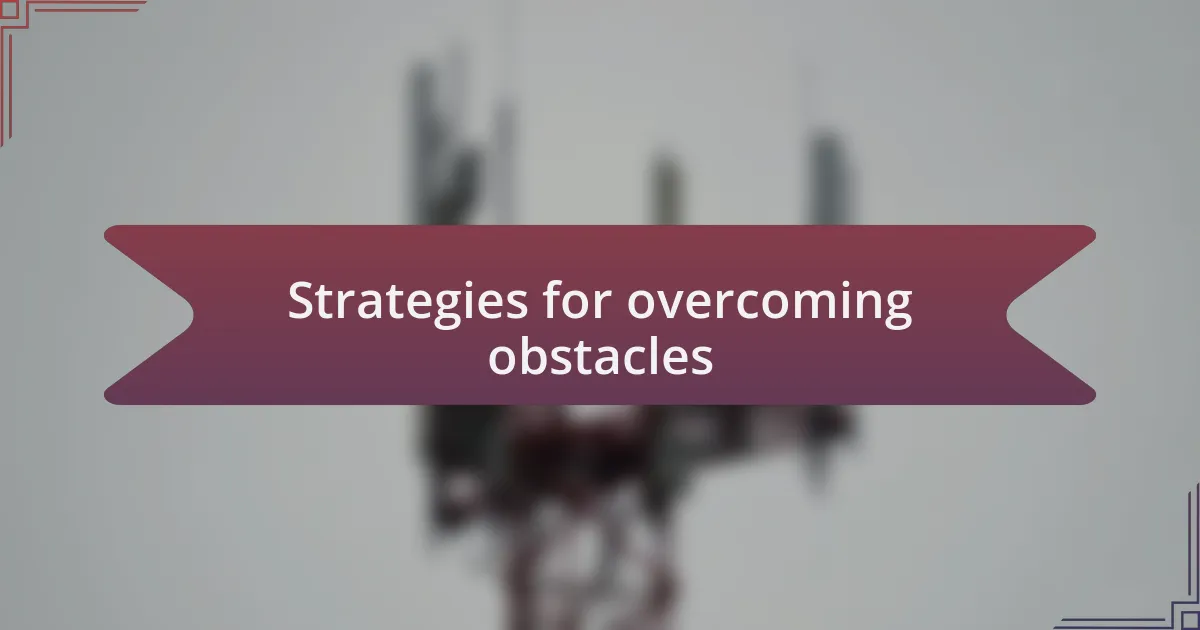
Strategies for overcoming obstacles
When I found myself knee-deep in bugs, taking a step back helped tremendously. Instead of trying to fix everything in one go, I learned to break down the problem into smaller, manageable parts. It’s almost like untangling a necklace—a bit of patience and methodical thinking can go a long way in finding the solution. Have you ever noticed how stepping away for a moment can give you a fresh perspective?
To tackle communication barriers, I started using visual aids during discussions. I remember drawing flowcharts and diagrams during team meetings; those visuals made complex ideas much clearer. It was a revelation to see my teammates lean in and actively engage. Isn’t it amazing how a simple diagram can bridge the gap between technical concepts and understanding?
Dealing with scope creep required a different mindset. I began implementing regular check-ins to reassess our goals and priorities. The first time I suggested a timeline review, I was surprised by how open my team was to discussing what truly mattered. It felt empowering to collectively agree on what features we could realistically deliver. Have you ever felt that sense of unity when tackling project challenges together?
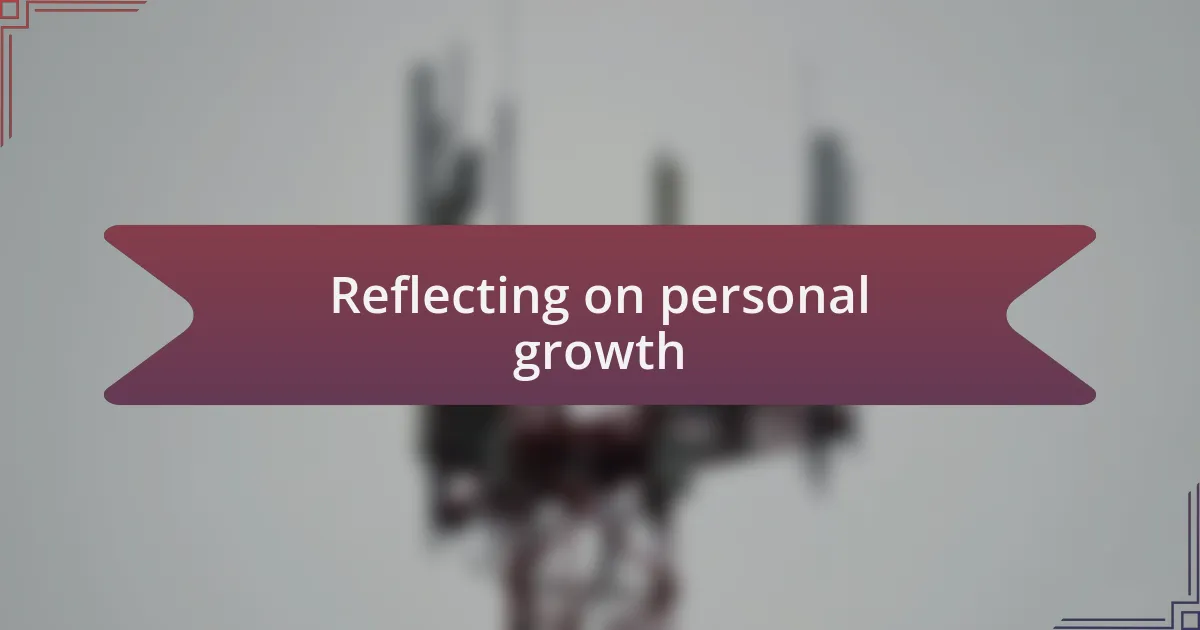
Reflecting on personal growth
Reflecting on my journey, I realized the importance of resilience. After my first project, there were moments when I felt entirely overwhelmed. I remember staring at the screen, unsure if I could meet the next deadline. It taught me that persistence isn’t just about pushing through; it’s about adjusting my approach and believing in my ability to improve. Isn’t it fascinating how struggle can lead to strength?
As I think back, collaboration emerged as a significant aspect of my personal growth. I vividly recall the late-night brainstorming sessions with my team, where diverse ideas sparked creativity like a fireworks display. These experiences showed me that learning from others is invaluable. Have you ever found inspiration in unexpected places when working with others?
Lastly, I came to appreciate the balance between confidence and humility. Early in my project, I was eager to showcase my skills, but I soon learned that asking for feedback was equally crucial. I distinctly remember a moment when a mentor offered constructive criticism that deepened my understanding. How often do we forget that growth often stems from embracing our vulnerabilities?